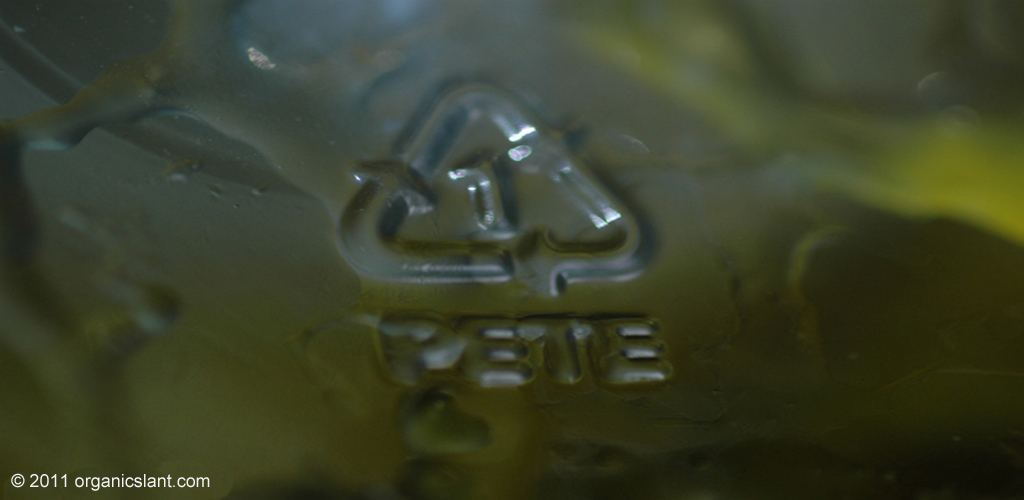What is BPA anyway? Bisphenol A (BPA) is an industrial chemical used to make one type of polycarbonate plastic and certain types of epoxy resins. BPA has found its way into our bloodstream.
These plastics are found in many products, such as refillable beverage containers, protective linings in food cans, receipts, compact disks, plastic dinerware, impact resistant safety equipment and epoxy resins.
The general population exposure (99%) is by eating food or drinking beverages that contain trace amounts of BPA. BPA can be found on cash register receipts and can easily pass thru the skin into the bloodstream.
BPA is an endocrine disrupter that imitates effects of the hormone estrogen. In animals, BPA is associated with estrogen-like effects, including changes in fetal/neonatal prostate glands and breast tissue. There is controversy about whether animal studies are relevant to humans. Some scientists and consumers are concerned enough that they suggest taking steps to reduce exposure to BPA.
Endocrine disruptors are synthetic substances that, when introduced into the body, either imitate or block the effects of the body’s natural hormones. Naturally-occurring hormones include estrogens, androgens (e.g. testosterone), thyroid hormone, and pancreatic hormones. Therefore, artificial interference with hormone actions prompts concerns about reproductive effects and developmental effects, the body’s ability to regulate metabolism, and the body’s ability to use insulin, among many other possible effects. In animal studies, BPA has been shown to affect estrogens.
The risks of BPA exposure, unfortunately, extend far beyond heart disease. Over 150 peer-reviewed studies have liked BPA exposure to issues including cancer, Alzheimer’s, Down syndrome, obesity, and developmental and reproductive abnormalities. Yet BPA remains pervasive in products and the environment at large. The U.S. government does nothing to protect us either. The FDA still refuses to impose limitations on this chemical.
The majority of people in the United States have measurable quantities of BPA in their urine. In 2003-2004, the U.S. Centers for Disease Control and Prevention (CDC) assessed 2,517 US residents aged six and older. BPA was detected in the urine of 93 percent of samples.
In three separate studies last year, conducted all over the world, researchers discovered BPA in cash register and ATM receipts. Worse yet, further studies showed that the BPA rubs off easily onto a person’s hand. A recent report from the French government says BPA is quickly absorbed into the skin and then the bloodstream.
A recent study of pregnant American women found that cashiers, who work with receipts all day, have higher levels of BPA in their blood and urine. Since BPA passes so easily into the body, it may also pass easily into the fetus, which means a mother’s BPA exposure could be hazardous to her children.
Appleton Paper, a company in Wisconsin, makes the kind of paper used for sales receipts. The company’s receipt paper comes with something new-tiny flakes of red fibers on the back. Next time you come across a receipt, flip it over and see whether you can see red. If you do, rest easy-because Appleton’s receipts do not contain BPA.
The plastics industry has already eliminated BPA in most baby bottles. It is also now possible to buy drinking bottles labeled “BPA free”. But some question the safety of what has replaced it. There are efforts to develop linings for food and formula cans that do not contain BPA.
How can consumers avoid BPA?
- Ask the manufacturers of the canned foods you eat if they use BPA in their can liners. It’s easy: their phone numbers and web page addresses are on the labels. Eden is one company that uses BPA-free can.
- Choose fresh food over canned.
- Do not use canned infant formula-or at least contact the manufacturer to see if BPA is in the can liners.
- Avoid using #7 plastics and never microwave plastic containers or put them in the dishwasher. Throw out old, scratched plastic bottles and containers.
- Use stainless steel drinking bottles that do not have plastic liners.
So it’s up to us as consumers to do our best to avoid BPA as much as possible. Choose glass over plastic and plastic-lined can whenever you can. When you do use plastic, make sure it’s BPA-free, or at the very least, don’t heat it or leave it in a place like a car where it may get hot. Avoid canned goods unless they state on the label that the container is BPA-free.
The Environmental Working Group did a nice report on BPAs. It reveals a timeline for BPAs from Invention to Phase-Out. They also offer a guide to children’s health and baby bottles.

 Blood Sugar Stability the Organic Way: Low-Glycemic Foods and Meal Ideas
Blood Sugar Stability the Organic Way: Low-Glycemic Foods and Meal Ideas Animal vs. Plant Protein: These Protein Sources Are Not Nutritionally Equivalent
Animal vs. Plant Protein: These Protein Sources Are Not Nutritionally Equivalent Billions of nanoplastics released when microwaving baby food containers
Billions of nanoplastics released when microwaving baby food containers Soaking Potatoes In Water Before Frying Reduces Acrylamide
Soaking Potatoes In Water Before Frying Reduces Acrylamide